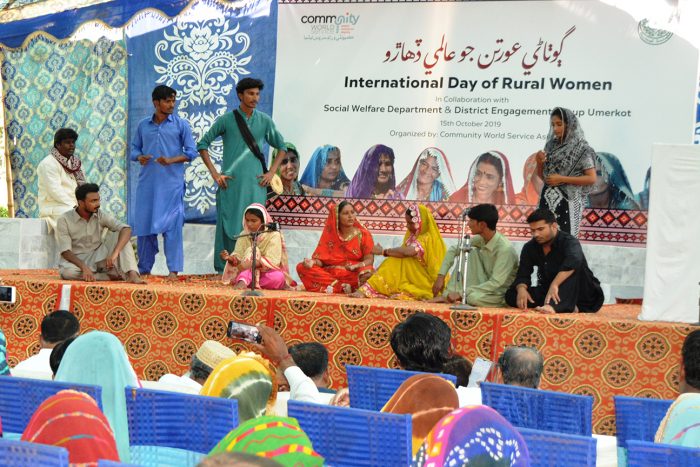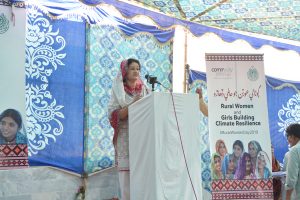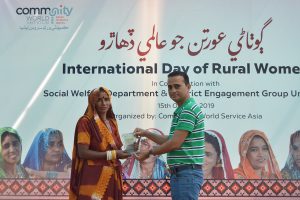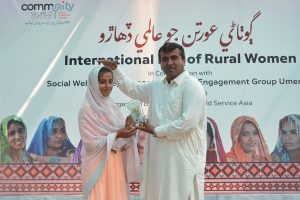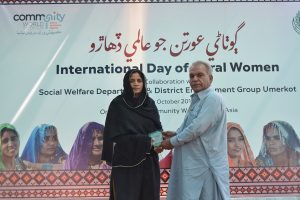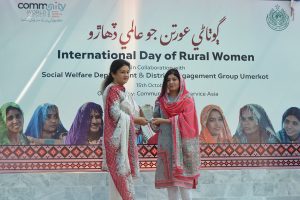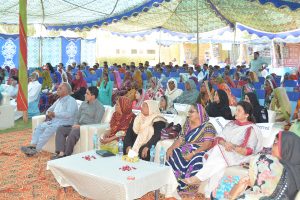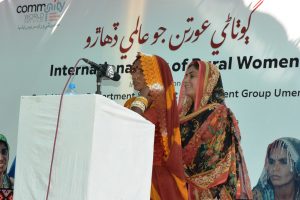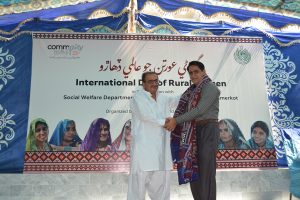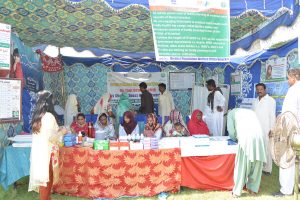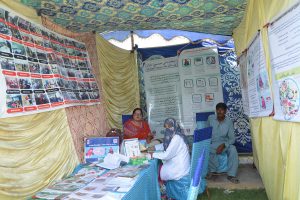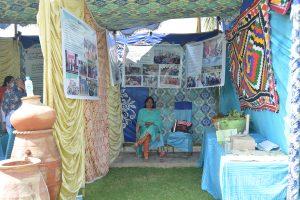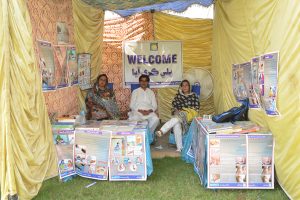Umerkot Celebrates the Invaluable Contribution of Rural Women to Development
Community World Service Asia, in collaboration with the Social Welfare Department and District Engagement Group[1] (DEG) Umerkot, celebrated the International Day of Rural Women 2019 to pay tribute to the rural women who are playing a vital role in the development of their communities. More than three hundred people attended the event. Participants of the celebratory event included representatives from the district administration, police force, local government, the Population Welfare Department, Women Development Department, civil society organizations, teachers, artisans and the rural women of the district.
At the event, rural women were awarded appreciation shields for their proactive role in promoting socio-economic and cultural development in their communities. A local theater group, named Pirbhat, performed a play that conveyed messages on the role of rural women in societal development and climate change awareness as part of one of the event. The play was emotional in nature and gave a strong message. As part of the event format, participating human rights defenders, specialists and relevant government representatives gave inspirational speeches and acknowledged the contribution of women in socio-economic development, food security and rural development. Stall was set which displayed handcrafted apparel and home accessories produced by rural artisans.
Contributions and Challenges of Rural Women
The crucial role that women and girls play in ensuring the sustainability of rural households and communities and their overall contribution towards improving rural livelihoods and community wellbeing has lately been increasingly recognized. Women account for a substantial proportion of the agricultural labor force, including informal work, and perform the bulk of unpaid care and domestic work within families and households in rural areas. They make significant contributions to agricultural production, food security and nutrition, land and natural resource management, and building climate resilience.
Structural barriers and discriminatory social norms continue to constrain women’s decision-making power and political participation in rural households and communities. Women and girls in rural areas lack equal access to productive resources and assets, public services such as education and health care, and infrastructure, including water and sanitation, while much of their labor remains invisible and unpaid, even as their workloads become increasingly heavy due to the emigration of men. Globally, with few exceptions, every gender and development indicator for which data are available reveals that rural women fare worse than rural men and urban women and that they disproportionately experience poverty, exclusion and the effects of climate change.
The impacts of climate change, including on access to productive and natural resources, amplify existing gender inequalities in rural areas. Climate change affects women’s and men’s assets and well-being differently in terms of agricultural production, food security, health, water and energy resources, climate-induced migration and conflict, and climate-related natural disasters.
Comments from Speakers
Rashida Saand, renowned women’s rights worker from Umerkot, commented during her speech,
We believe that rural women have unique ideas and indigenous solutions to solve the current challenges facing a society that must be heard by the government and decision-makers. To benefit from the wisdom of women, community organizations must amplify the voices of rural women and call for women’s inclusion in the decision-making process at all levels.
Tarique Waheed Baloch from Women Development Department said that, on the occasion of the International Day of Rural Women,
They shall be encouraged to struggle for their just right of education, social welfare, and their legitimate rights. Village girls should be encouraged to get an education and step ahead in the field. Rural women face, among other problems, under-age marriages, and domestic violence, while they also share in work with men in agriculture and livestock farming besides sewing and embroidery. The government should ensure that technical training programs for rural women in the field of vocational training be started to provide them with opportunities to earn better incomes and live a better life along with educating their children.
Muhammad Bux Kumbhar, DEG member, said the observance day recognizes,
The critical role and contribution of rural women in enhancing agricultural and rural development, improving food security and eradicating rural poverty. As the world faces a critical need to act against climate change, this year’s theme highlights the important role that rural women and girls play in building resilience to face the climate crisis. Rural women represent the backbone of many communities, but they continue to face obstacles that prevent them from realizing their potential. The devastating impacts of climate change add to their hardship. Almost a third of women’s employment worldwide is in agriculture. Women cultivate land, collect food, water, and essential fuels, and sustain entire households, but lack equal access to land, finances, equipment, markets and decision-making power.
The guest of honor, Dr. Rubi Dharmdas from Umerkot, paid thanks and applauded Community World Service Asia, the Social Welfare Department Umerkot and District Engagement Groups for organizing such a great event to pay tribute to rural women. She added,
The contribution of the rural women is not being given due importance. Moreover, the right to basic facilities such as education and health are also overlooked. This is a great tradition initiated by Community World Service Asia to honor rural women by giving them due respect in terms of awards, as it will encourage many rural women to play a vital role in society.
[1] The District Engagement Group (DEG) comprises representatives from district-based CSOs, Steering Committees and Social Welfare Department responsible for networking and influencing relevant stakeholders and government departments on implementation of laws and policies related to women empowerment.





